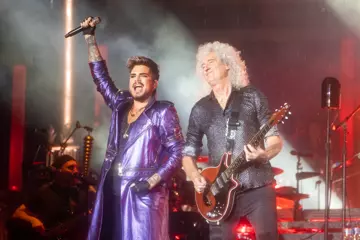Frontman Blair Shehan – who went on to form acclaimed outfit The Jealous Sound – reflects fondly on their initial tenure, recalling that there was no acrimony in the split and that the band just seemed to have run its course. They may have shared stages with revered acts like Pavement, Jawbox and Rocket From The Crypt, but they never quite achieved the same popularity of those bands, and soon saw the writing on the wall.
“It was the ‘90s so it was a little bit different,” Shehan reflects. “We’d play with those bands when they’d come through town, and it was always really exciting for us to play with bands that we looked up to. But as time wore on a little bit with Knapsack, we ran into the same bands a lot and became friends with them more on our level – more of our scene.
“We were the tougher side of indie rock, what they consider that ‘’90s emo sound’ or whatever that everyone looks back on, and we were on parallel courses with a lot of bands that we’d hook up with regularly. It was pretty scrappy for the most part. It wasn’t very well-defined, not like today – it was kind of finding its feet while we were doing it. We really didn’t have a big game plan – it was whatever came our way and we’d take whatever we could get.”
Don't miss a beat with our FREE daily newsletter
The ‘emo’ tag was bestowed on Knapsack chiefly because Shehan’s confessional lyrics were so incredibly personal and forthright. “It’s not so precious to me, so I don’t really care what terminology’s used,” he laughs. “[Emo]’s a catch-all phrase that can evoke a certain idea of how something can be classified – it’s never bothered me. The version in our era is defined in my mind of what the bands were like and what we were like. It’s never been an issue with me – you can call it what you like, just show up!”
He does, however, attest that the creative process for him ultimately proved to be cathartic.
“I’ve definitely had records that encapsulate a certain time of your life and whatever’s going on for you, and I’ve had some self-driven dramatic turns in my life that these records were part of at that time, so they’re something… I don’t know exactly how it all works, but it’s certainly something that’s authentic to me so it’s a feeling where if I listen back I can go, ‘Oh wow, that’s describing that situation for me.’ And then there’s a satisfaction in completing the work. So yes there’s a cathartic sense to it but it’s broad – there’s a ton of different things that happen from doing that, a sense of satisfaction and knowing that you did your best.
“Art creates a context for what my life is and [what] everbody’s life is like, but it does it in such a way that it elevates the conversation of our daily lives. It’s an artistic look at your life, and whether it’s poetry or painting or music it elevates it to something more, just via the discussion. It’s not just humdrum or our life in simple terms, it’s a more elegant way of discussing those things.”
Revisiting the Knapsack catalogue has also given Shehan a fresh perspective on the band’s music.
“It’s been nice to play those songs,” he admits, “and there’s an economy of style that I used when I wrote them and a simplicity to the delivery of those songs out of necessity because I maybe didn’t have a grasp of how to do things in a more complex way, and there is the mind of a young man who’s going through whatever I was going through at those times discussing that and reaching to be more than I was which is fun to re-examine. And the songs are really visceral songs – they’re urgent and fun to play, and overwhelmingly, with the crowd interaction, it becomes a celebration and feels really good to do that.”















